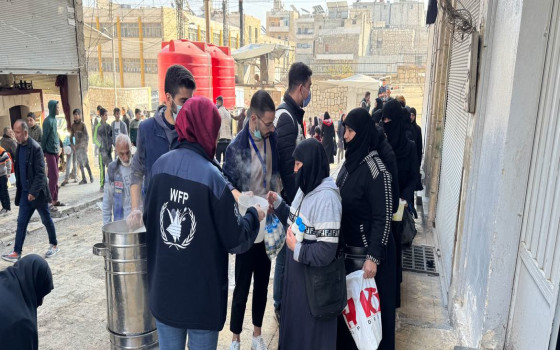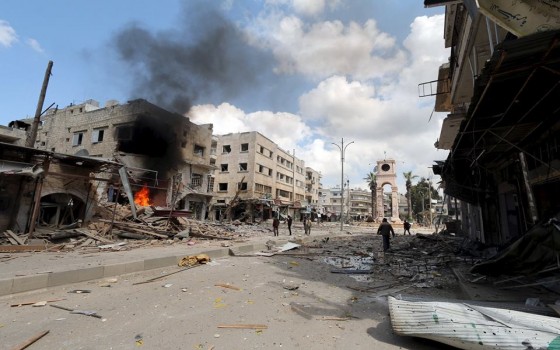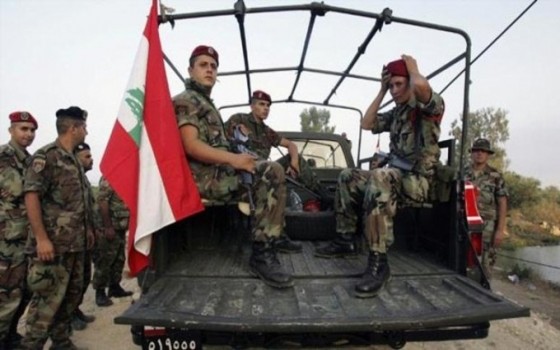
The United Nations urges the Syrian people to "unite" .. an appeal to protect civilians and efforts to reveal the fate of the missing

- Europe and Arabs
- Saturday , 14 December 2024 8:7 AM GMT
Damascus - Geneva: Europe and the Arabs
Adam Abdelmoula, the United Nations Resident Coordinator and Humanitarian Coordinator in Syria, said that the festive atmosphere prevailed throughout the country on the first Friday after the fall of the Assad regime, stressing that his office had not received any reports of violations in the context of these celebrations.
In a special interview with UN News, he said that a UN team traveled from Damascus to Aleppo and returned to report that they "did not see any roadblocks on the road and did not experience any security incidents at all, which gave us some reassurance that we are able to begin expanding the scope of our humanitarian response."
Despite the guarantees provided by Hay'at Tahrir al-Sham that government institutions would continue to operate, he confirmed that the feeling of fear in the past days prevented government employees from returning to their jobs, including police forces - which led to the organization's members taking on the task of establishing security in the places they control. However, he said that in the past two days, employees have gradually begun to return to their work, and things will become clearer in the coming days.
In response to a question about how the United Nations works with Hayat Tahrir al-Sham, which is on the Security Council’s list of terrorist organizations, he said that the organization deals “with any party that controls a geographical area within which there are people who need its services,” and that it “does not legitimize anyone or deny legitimacy to anyone” through communicating with it.
Despite the festive atmosphere, Mr. Abdul Mawla warned that the security situation remains extremely volatile, especially in areas where hostilities have continued over the past few days between the Syrian Democratic Forces, Hayat Tahrir al-Sham, and the so-called National Army, in addition to the intensive Israeli attacks, which have indirectly led to the suspension of some humanitarian organizations’ work “for fear of finding themselves in the wrong place at the wrong time.”
Amid this scene and as human movements continue inside Syria, and as refugees are expected to return to their homes in the coming period, the Humanitarian Coordinator urged the international community to provide the necessary assistance to support the extremely fragile infrastructure and basic services, to avoid aggravating the “already deep” humanitarian crisis.
The Syrian people are now urged to “unite, unite, unite,” stop the bloodshed between the Syrian factions, and start early on the reconstruction. Mr. Abdelmoula stressed that the Syrians are a creative people with many capabilities, “and with a little help from the outside, they can rebuild their country, which was in many areas very advanced before the crisis.” For her part, the spokesperson for the UN Special Envoy for Syria said that his office is closely monitoring developments in Syria, and that it continues to work to ensure that the Syrians are at the forefront of charting the way forward, and that there is a common and unified message from the international community.
At the UN agencies’ press conference in Geneva on Friday, Jennifer Fenton reported that the office of the Special Envoy, Geir Pedersen, continued daily communication with a wide range of actors in Syrian civil society inside and outside the country.
She added: “Mr. Pedersen has left for Jordan to hold high-level contacts, where he is expected to meet over the weekend with Arab foreign ministers and other senior officials, and the foreign ministers of Turkey and the United States.” Credible transitional arrangements
The spokesperson for the Office of the Special Envoy appealed to all armed actors to maintain law and order, protect civilians and preserve public institutions in line with international humanitarian law. “While there have been developments towards temporary stability in some areas, many challenges persist, no single group has a monopoly on violence, and the situation remains volatile,” Fenton said.
She added that the UN urges de-escalation, “and calls for an end to all escalating attacks, including Israeli strikes, and an end to conflicts in the northeast, in particular, and elsewhere, which have had a destabilizing effect on an already volatile country.”
She stressed the importance of preventing conflicts between different armed groups, “that public services continue to function, and that credible and inclusive transitional arrangements are established in Damascus.”
The spokesperson for the Office of the Special Envoy for Syria said that the images from Saydnaya and other detention facilities “starkly underscore the unimaginable brutality that Syrians have endured and reported for years.” More on the Special Envoy's statement on prisons in Syria at the link
The fate of the missing
Stéphane Saclayan, head of the delegation of the International Committee of the Red Cross, spoke about the issue of the missing and the right of their families to know what happened to them. Sakalian said that in the past 13 years, the committee has recorded, through direct contact with families, 35,000 cases of people who disappeared in Syria, adding that “behind each of these cases, there is a family and an excruciating pain that gets worse with the passing of the years. He explained that with the opening of prisons and the release of detainees, those families lived an emotionally difficult moment, “a moment full of hope, but also pain, anger and frustration.” He reported that he and his team went to Sednaya prison where they saw piles of damaged documents scattered in different rooms; these records may contain crucial information that could help families find long-awaited answers, adding that the team placed the documents in the custody of those responsible for prison security. He said that days ago, the International Committee of the Red Cross opened hotlines for released detainees and their family members seeking to be reunited with them, and immediately offered to help all parties in power in Syria to locate the missing. He said: “Giving people answers will take years, given the numbers of missing people across the country, and will require a collaborative effort "Intensified by multiple actors."
Thousands of refugees return
The UNHCR representative in Syria, Gonzalo Vargas Llosa, said that thousands of Syrian refugees have begun returning to the country from Lebanon through the official border point (Masnaa) and other informal border crossings, while other Syrians have fled in the opposite direction to Lebanon, warning that "there is movement in both directions" across the Syrian-Lebanese border.
He added at the press conference in Geneva: "(On Thursday), we had about 2,000 returns of Syrians from the main border with Lebanon. Syrians returned to Idlib, Rif Dimashq, Damascus, Daraa, Aleppo and other places."
He also pointed out that Syrian refugees are returning from Turkey through the Bab al-Hawa and Bab al-Salam crossings to northwestern Syria. He pointed out that one of the main challenges is the lack of immigration authorities on the Syrian side, as all immigration officials who worked there under the former regime have left their posts, and the new transitional authorities have not yet been able to establish immigration procedures.












No Comments Found